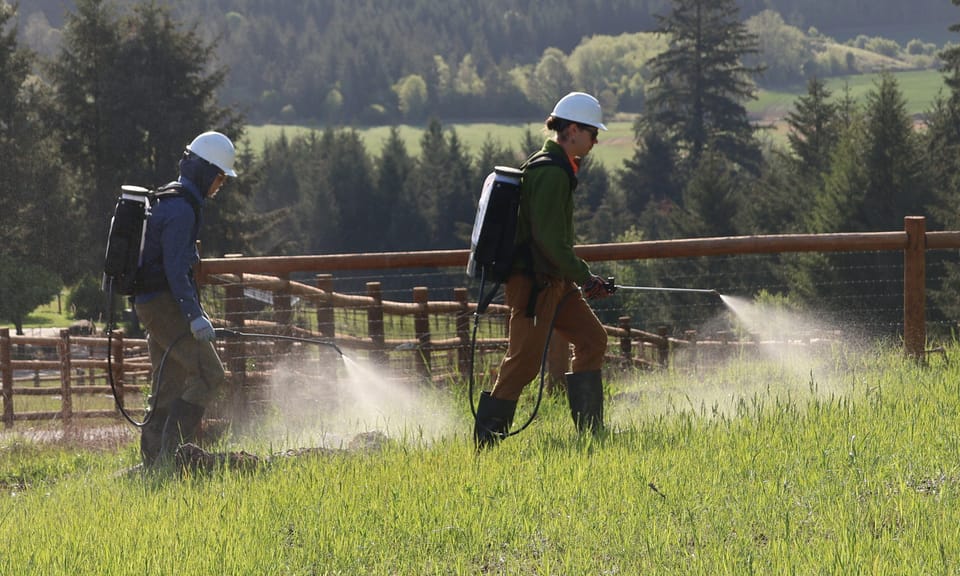Beyond the Weeds: How Herbicides Reshape Living Soils

When we tackle unwanted plants with herbicides, we often focus on the visible changes above ground. But what if these powerful chemicals are doing far more than just targeting plants? What if they're also profoundly altering life in the soil as well? It turns out, the soil's intricate biological community is deeply affected, and understanding these impacts is crucial for our efforts in habitat restoration, fostering healthy ecosystems, and even locking away carbon for a healthier planet.
One of the most common herbicides, glyphosate, widely used in habitat restoration, offers a prime example. This chemical isn't just a "plant killer"; it's patented as a "biocide." This means it’s designed to affect living organisms more broadly, including the vital bacteria and fungi that call the soil home. Many herbicides share this wider, biocidal impact on the soil ecosystem, making it essential to study their effects in detail.

A Biological Mode of Action
At its core, the glyphosate molecule works by disrupting a plant's ability to produce amino acids – the fundamental building blocks of proteins. It acts as an enzyme inhibitor, specifically targeting and blocking an enzyme called EPSP synthase. Think of it like a crucial wrench in a factory: if that wrench is removed, the factory can no longer assemble its products, leading to the plant weakening and eventually starving.
But here’s the critical part: this same EPSP synthase enzyme isn't just vital for plants. It's also essential for many soil microorganisms, including bacteria and fungi. When this enzyme is blocked, these tiny workers of the soil can't build the proteins they need for growth, reproduction, enzyme function, and all their structural components. Essentially, glyphosate starves them of these critical building blocks, severely hindering their ability to thrive or even survive.
Initial Applied Tests Demonstrate Microbial Impact
To better understand this wide-ranging effect, Phoenix Regen conducted a small experiment in Summer 2025. They took biologically active and diverse compost soil and treated it with two different solutions. One group received a 2% glyphosate solution, while the other was treated with a 0.15% humic acid solution. These specific concentrations were chosen because they reflect typical amounts used in real-world habitat restoration projects.

After 20 days, researchers examined the soil biology under a microscope. The results were stark: glyphosate applications led to a significant reduction across all types of biology compared to the humic acid applications. Live protozoa (tiny single-celled organisms) decreased by a substantial 55%, and live fungi saw a 28% reduction. Even dormant forms, like protozoa cysts and fungal spores, were not spared, decreasing by 42% and 24% respectively. While this was an initial study, these numbers suggest a potentially severe impact of glyphosate on microbial populations.
Herbicides may Reduce Genetic Diversity in Soil Microorganisms
This doesn't necessarily mean all fungi or bacteria simply disappear. Instead, glyphosate can also trigger a significant shift in the types of fungi and bacteria that are allowed to multiply and thrive in a system. Imagine a diverse community where helpful neighbors keep things running smoothly. When a disturbance occurs, the helpful neighbors might leave, and less desirable or even harmful elements could move in and take over.
Indeed, a recent journal article, "Indirect Effects of the Herbicide Glyphosate...", highlights this precise problem. It notes that beneficial bacteria crucial for plant growth and healthy animal guts are often negatively affected. Meanwhile, pathogenic (disease-causing) bacteria and fungi can actually be enhanced.
Another article, "Pesticide Diversity Impairs Soil Microbial Functions," points out that bacteria can lose genetic diversity following herbicide application. This suggests that herbicides might not just reduce the number of microbes but also diminish their genetic richness and functional capabilities.
When you combine these effects, the application of multiple herbicide products can lead to several critical implications:
- Increased numbers of soil pathogens and diseases.
- Reduced diversity among microbial species.
- Less genetic diversity and functional expression within bacterial species.
- Higher bacterial metabolism rates, which means they consume more soil nitrogen and carbon reserves.
- A decrease in soil carbon (organic matter), an increase in carbon release into the atmosphere (off-gassing), and ultimately, reduced ability of the soil to store carbon.
With all this in mind, we recognize that herbicides are important tools for managing vegetation in various contexts. However, we at Phoenix Regen believe that responsible use of herbicides requires a deep understanding of their multifaceted impact on natural environments. More extensive study is needed, along with innovative solutions to mitigate the potential degrading effects on soil quality. By pursuing this knowledge and developing better practices, we can genuinely achieve our goals for healthy soils – soils that provide the essential ecosystem services we all depend on.
Sources:

Member discussion